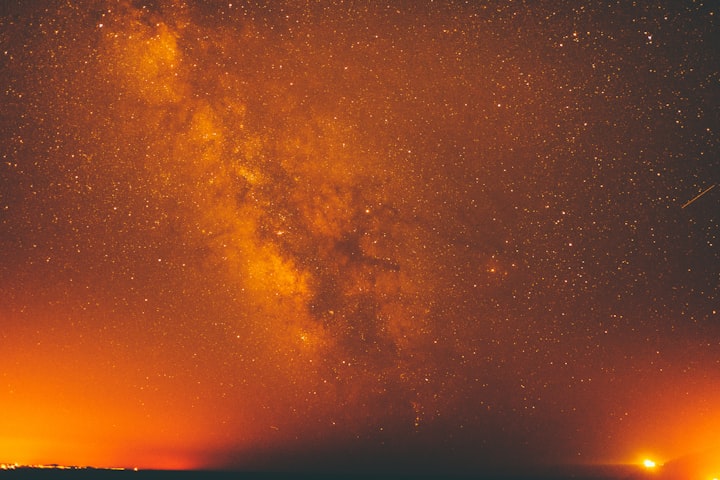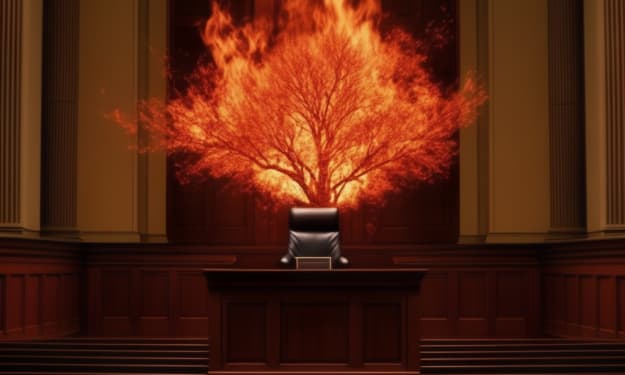
Nobody can hear a scream in the vacuum of space, or so they say. No one will see your tears fall or roll down your face. You can't go for a walk. Imagine not being able to run away. You will see the sun but will never experience the day.
"Who in the world came up with the lyrics to this song, and why is John forcing us all to listen to him sing it a few hours before we take off," says Captain Andrew.
"I wrote the lyrics," says First Officer John, "I sound good, don't I? I think I wanna be a musician in my next life."
Andrew gets up and heads to the back room. Before he exits, he adds, "That's great, John, but can you spare us the doom and gloom, please? We need a song that's more uplifting instead of depressing. Don't you agree, Shadai?"
I nod, unable to stop myself from sweating. I rub my clammy hands against my pants. Pacing back and forth does not help. The anticipation is too much. This will be my first flight, and although I know NASA has prepared us well, my heart is trying to break through my chest.
Within the hour, John, Andrew and I exit the crew quarters. Standing outside are many of our friends, family and the people who helped prepare Kubernetes (K8) for the mission.
I scan the crowd and spot her standing next to my mother, her tiny hand waving at me. In her other hand, Violet clutches the painting I made of the two of us. I had given it to her only a few hours ago. The hardest part about the mission is leaving her—the person who owns my heart—behind. The corners of my eyes are stinging. I look away and take a few deep breaths.
"It will only be a few months," I remind myself.
We head to the pad, where the astronaut personnel help strap each of us into K8.
"Man, I can't believe the time has come," says John.
"I know, right," says Andrew, "When they first mentioned this mission, the launch date seemed so far away. Look at us here now. I'm looking forward to it being a success. Are you excited, Shadai?"
"Yes, I am," I respond, happy that no one can see the few tear drops that roll down my face.
"Mom will be back soon," I whisper. I know Violet is still out there with my mother. They won't leave until we become nothing more than a dot in the sky.
A voice from the command center interrupts my thoughts.
"We are expecting excellent weather today. Good luck, everyone."
Only a few minutes away from launch.
"Take off in 3,2,1."
I feel my body sinking into my launch pad as if gravity is pulling me towards the ground. There is a spark within me, like a surge of adrenaline radiating through my core.
K8 quickly exits through the sound barrier. One minute later, K8 accelerates to 10,000 miles an hour. If only I could catch a view of the Atlantic in the background. In 8.5 minutes, we achieve our desired speed and shut down the engines. We jet off the external tank while we push out at 17,000 miles an hour.
Once we shut the engines down, Andrew and I unstrap ourselves to begin taking pictures and videos of the orbiter. We perform a rendezvous pitch maneuver to image the underside of the orbiter to assess for any damage.
We will travel to the moon within three days to complete the Argentine mission; to test different technologies, including sustainable and reusable materials that will advance human exploration to other planets such as Mars.
Throughout our journey, we maintain communication with our station in Denver.
All I long for is to hear Violet's voice.
"Mommy will be back before you know it," I had told her. I hate that I will miss her seventh birthday. As the first female to embark on this journey, NASA needs my skill set as a robotics specialist. I could not say no. Leaving Violet behind is tough. Thankfully my mother will take great care of her until I return.
Everything goes according to plan until we lose our communication path to earth.
John sends a signal to our command station, and we wait. Twenty minutes go by, and nothing. Forty minutes go by, and still no return on communication.
We try for hours but unfortunately can't restore any connection.
"I think space dust is responsible for this sudden and continued loss of communication," says John.
"I thought that was just a theory."
"I didn't think you would know much about that, Shadai."
"I know enough. Upon impact with an object in space, space dust turns into plasma due to its high velocity. It has been theorized that this plasma can cause radio signals capable of causing damage to the satellites that they hit. We may also have an internal problem. It doesn't have to be external."
John does not respond but gets on the floor, attempting to rewire our communications system. His lack of response does not surprise me.
John always thinks he's above everyone else.
"It could be any of the reasons you both mention," says Andrew in his typical low and calm voice. "Let's focus on landing. Hopefully, we can reestablish our communication path when we land."
But when a loud bang sends our spacecraft into a short spiral, Andrew barks, "Get into your cryo suits ASAP." I can see our display flashing, indicating damage to our left wing.
We run into the cryo chamber.
"We need to get into our cryo-pods now," says Andrew, yelling this time.
With shaking hands, I rip off my launch suit. The cryo suit feels heavier than I remember.
I go through the steps mentally, reminding myself to breathe and stay calm. That is what they teach us at NASA. They train us not to panic and how to stay alive.
My zipper is stuck.
"Shadai, you need to hurry up!" yells John before getting into his cryo-pod.
The spacecraft begins to spiral again.
"Shit now is not the time!" I say while fumbling with the zipper.
Andrew is saying something, but I can't hear him. My heart is pounding like hundreds of wild stallions are inside my chest. It's the only noise stuck in my ears.
My hands are moving fast, but the spacecraft is spiraling more quickly. The last thing I remember is my head making an impact with the door of my cryo-pod.
.......
"Welcome back, Shadai."
I open my eyes and see Captain Andrew staring at me.
"Are you ok?" he asks.
My eyes are adjusting.
"Are you ok?" he asks again. "How's that head."
I place my hand on my forehead, circling a raised bump.
"Not too bad. How did I get into the pod?"
"I got you in."
"Thanks, Andrew. That was some scary stuff, huh."
"Yeh, it was."
"Are we able to communicate with Denver yet?"
Andrew scratches the back of his head, "Unfortunately, no. John is restarting the communication system. He's gonna attempt another call to Denver." He raises both hands in the air. "Let's see what happens."
Andrew places his hand gently on my shoulder. "Why don't you complete your analysis with the brain activity analyzer."
Before coming to NASA, Captain Andrew was a former air force pilot with a medical degree. For such an ambitious and educated man, he is so humble. I wish John would learn a thing or two about humility from him.
"I looked at the data. We were orbiting for over seven months before landing."
"Seven months," I yell out. The first person that comes to mind is Violet. What if she thinks that I am dead?
"It's a surprise we are still alive with a missing left wing," says Andrew. "I consider us very lucky."
"What happened?" I ask.
"From my preliminary analysis, I think we hit some space debris. NASA is supposed to warn us of these things in advance, but the disruption in our communications made it difficult to communicate with them."
We join John next to the command and data-handling system.
"I think there may be an issue with the cables outside," says John.
"John, you've been at this for hours." Andrew interrupts." Let's eat something first. Then we can continue assessing the damage."
"Macaroni and cheese or spaghetti?" he asks, holding both pouches in his hand.
Andrew talks while we eat. "Our priority is to repair the communications system. Once we contact control in Denver, they can help us verify where we are and give us appropriate orders. If we can't get orders, we have no instructions on what to do. The good thing is we still have power, and most of our systems are functioning."
"With the lack of communication, folks back home probably think we're dead," says John.
Next, I see John on the floor, rewiring the system. I stare at his empty pouch in disbelief.
"Did you chew your food, John, or swallow everything whole?"
Andrew erupts in laughter.
"I'm simply trying to do my job as our communications engineer."
"I get it. I hope we can reestablish communication. I would love to hear my daughter's voice," I say.
"Don't worry, Shadai, I am doing the best I can. I tried to connect to a secondary antenna, but I'm not sure I've made enough progress. We will need some pictures from outside to assess further damage," says John.
I could not believe it—John was capable of empathy.
While I turn on the robotic arm to obtain pictures, John switches out the avionics card, but nothing changes.
"Maybe something is wrong with the external cables. I'll get you some pictures," I say.
The first thing that captures my attention besides the dust layer is the subsurface's color– a mix of reds and browns. I spin the robotic arm towards the cables and catch a glimpse of the lavender and bluish sunset.
The sun, the size of a coin painted in blue, descends below the horizon. I couldn't take my eyes off it as it disappeared, leaving behind silvery blue streaks and curls dancing and glimmering in the twilight.
Our sunsets on earth look nothing like this. It is like watching an artist paint.
Violet comes to mind again. She had already lost her dad. I won't let her lose me, too. I turn the camera around and get back to work.
After a few hours, I obtain the pictures. I couldn't wait to see what Andrew and John had to say about them.
"The surface looks red," says Andrew.
"More like maroon to me," says John. "How the heck did we make it to Mars?"
"I'm glad we landed somewhere. Now NASA will know where to find us," says Andrew.
"See here." I point to the pictures on the iPad. "We will need to swap out the cables. I can't believe how damaged they are."
"Wow," says Andrew. "This isn't good. None of the cables are attached."
We spend several hours trying to come up with a plan. We've all had EVA training. NASA has not tested a specific procedure to change the external cables. It would be risky for us to try it in an unfamiliar environment, especially without detailed instructions from Denver.
"One of us needs to go out there and change the cables," says Andrew.
"That person may not survive, Andrew. And what if we experience a major flare storm during the process? Whoever is out there will end up very sick or even dead." I add.
"I think our spacesuits will give us 10, maybe 15 minutes max out in the environment. We need two of the major cables changed, according to John. We need to develop a fail-proof plan that'll allow that to happen. It's the only way."
Andrew decides that he will do the EVA. We need John inside to manage the communications system.
Andrew refused to let me go. He insisted that I had to remain safe for Violet.
After spending a day planning and rehearsing the proposed spacewalk, the time has come.
I cannot bare to look at Andrew as he leaves the safety of the airlock and sets foot on the Martian surface. We reviewed the procedure multiple times to ensure we achieved our desired outcome, but this is space, an environment outside our control.
"We are hoping to have you out of there in less than 10 minutes," I say to Andrew while watching him on the monitor. "Can you hear me, ok?"
"Yes," he says. Our main concern was ensuring that the dust and wind did not interfere with our communication.
Andrew successfully changes out the cables. Now it is John's turn to restart the communication system.
"I'm not sure what else I can do if this doesn't work," says John. "What if they don't respond to our call."
"Calm down, John," I say.
"Yes, calm down, John," adds Andrew. "Let's give it a try and see what happens."
"That was some great work, Andrew. Time to head back in," I say. "It's been eight minutes."
"I placed a call to Denver. Let's see if we get a response. It might take about 40 to 45 mins or so," says John.
"You guys won't believe this," says Andrew.
Both John and I say, "Believe what?" simultaneously causing Andrew to chuckle.
"I wish you both could see the sky right now. It is a lovely crimson."
"Lucky you, Andrew, but we need you back in here ASAP. It's been almost 11 minutes."
As Andrew returns to the spacecraft, the weather scanner begins to beep. I glance at the ultraviolet spectrograph.
"Oh no, oh no," I say.
"Oh man," says John as he stares at the spectrograph.
"What is it, guys?" asks Andrew.
"Andrew, you need to come in now," I yell. "We are about to experience a major flare storm."
I look at the timer I set. More than 12 minutes have passed.
"I am walking as fast as I can," he says.
The wind is beginning to pick up. We know how difficult it is to maneuver in a spacesuit.
I glance at the timer again. 13 minutes and 45 seconds. Andrew is about 300 feet away. Every second he spends out there exposes him to more radiation.
"Come on, Andrew, you're almost there," I say while John and I keep track of all the monitors. The numbers on the Radiation Assessment Detector are increasing.
There is a sinking feeling deep inside my abdomen. John can't sit still.
Less than 30 seconds left, and Andrew hasn't made it back to the airlock.
"Come on, Andrew," I scream.
"30 seconds left, man. You're almost there," yells John.
The storm is also seconds away. I am nauseous and find it difficult to breathe.
Suddenly, everything outside becomes bright and white. I can't see Andrew. I listen for his breathing.
"ANDREW," I scream as tears clump to my face.
About the Creator
Ali SP
Ali has found a renewed passion for reading and creating. It is now a form of expression for her– another creative outlet which she works to improve upon.
https://www.instagram.com/art.ismyrefuge/
Reader insights
Outstanding
Excellent work. Looking forward to reading more!
Top insights
Excellent storytelling
Original narrative & well developed characters
Easy to read and follow
Well-structured & engaging content
Compelling and original writing
Creative use of language & vocab
Eye opening
Niche topic & fresh perspectives
Heartfelt and relatable
The story invoked strong personal emotions
On-point and relevant
Writing reflected the title & theme
Expert insights and opinions
Arguments were carefully researched and presented






Comments (2)
Oh no, poor Andrew. I need to know if he survived the storm and also if they get a response to their call. This was a very gripping and suspenseful story. I loved it!
Spectacular sci-fi story!!! Enjoyed the read and loved it!💖😊💕